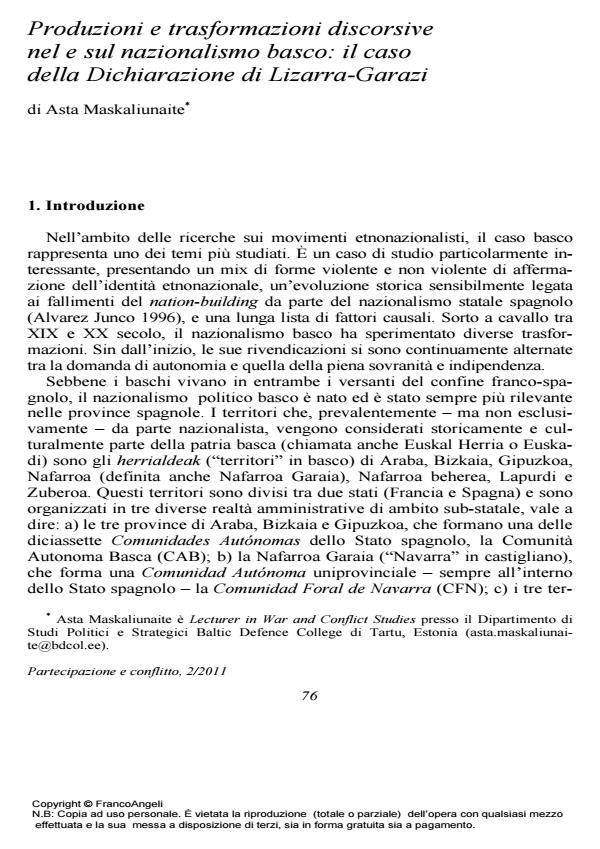Produzioni e trasformazioni discorsive nel e sul nazionalismo basco: il caso della Dichiarazione di Lizarra-Garazi
Titolo Rivista PARTECIPAZIONE E CONFLITTO
Autori/Curatori Asta Maskaliunaite
Anno di pubblicazione 2011 Fascicolo 2011/2
Lingua Italiano Numero pagine 23 P. 76-95 Dimensione file 556 KB
DOI 10.3280/PACO2011-002004
Il DOI è il codice a barre della proprietà intellettuale: per saperne di più
clicca qui
Qui sotto puoi vedere in anteprima la prima pagina di questo articolo.
Se questo articolo ti interessa, lo puoi acquistare (e scaricare in formato pdf) seguendo le facili indicazioni per acquistare il download credit. Acquista Download Credits per scaricare questo Articolo in formato PDF

FrancoAngeli è membro della Publishers International Linking Association, Inc (PILA)associazione indipendente e non profit per facilitare (attraverso i servizi tecnologici implementati da CrossRef.org) l’accesso degli studiosi ai contenuti digitali nelle pubblicazioni professionali e scientifiche
When it comes to research on the ethno-territorial movements, the case of the Basque nationalism seem to be one of the more popular subjects for investigation. It presents an especially interesting case for analysis with a mix of violent and nonviolent forms of mobilization. During the democratic post-Franco era, all the attempts to end violence seem to be doomed to fail; the divisions remain as strong as before both within the Basque nationalism and between Basque and Spanish political forces. Consequently, the misunderstandings, different interpretations of the same facts, different narratives creating even deeper divides between the political actors flourish as much as before. In the article is examined just one particular episode in the historical development of the Basque (and Spanish) nationalism: i.e. the events surrounding the signing and further interpretation of the 1998 Declaration of Lizarra. Already at a time when it was signed the Declaration of Lizarra became one of the most controversially interpreted documents in the Basque politics, and it had been shaping the Basque( and Spanish) political debate also in the following years. Studying this case it is illustrated the difficult relationship between violent and non-violent parties in ethnonationalist movements, as well as the complicated interaction between the regional ethnonationalist political parties and the state ones. Furthermore, the case serves as a good illustration of how the political discourse is transformed and as an illustration of the importance of interpretation in politics and of the use of "historical discourse" in these interpretations. It will show how the new political myths are created and how they inform the future interrelations between the involved parties.
Parole chiave:Basque Nationalism and Politics; Spanish Nationalism; Political Myth; Political Discourse; Peace Processes; Ethnonationalist Conflicts
Asta Maskaliunaite, Produzioni e trasformazioni discorsive nel e sul nazionalismo basco: il caso della Dichiarazione di Lizarra-Garazi in "PARTECIPAZIONE E CONFLITTO" 2/2011, pp 76-95, DOI: 10.3280/PACO2011-002004